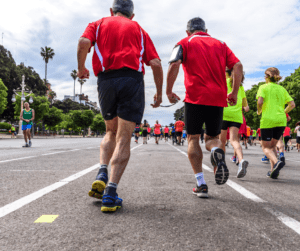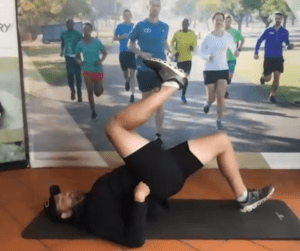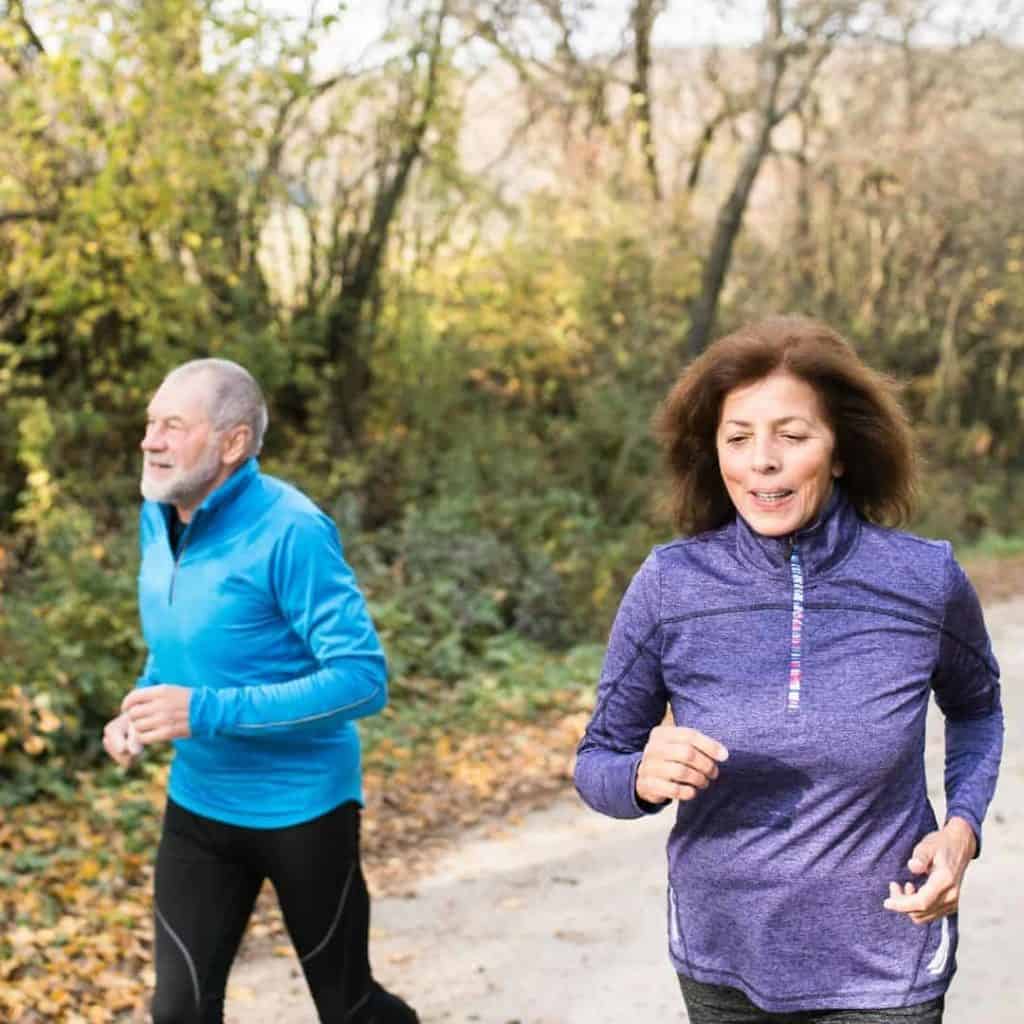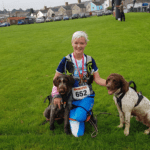We all get older and we all tend to slow down…
Aging is one of those things that happens to all of us…
Don’t get us wrong, continuing to run as you get older is definitely not all bad news.
It is possible to improve your running speed and stay injury-free once you reach your 50s and well into your 70s and beyond.
If you’ve got a smile on your face as a result of the above statement then, then good!
We’re going to help you avoid injuries, and keep/improve your running speed by adding just a few tweaks to the way your train.
Let’s first have a look at what exactly it is that makes us slow down as we get older…

Why You Slow Down As You Hit 50
Many studies show peak performance ages to be between 20-35 years of age for most sports and the physiological decline eminent thereafter.
According to Dr. Paola Wood, Senior Lecturer in the Department of Sport Science & Biokinetics at the University of Pretoria, South Africa, who is an expert in the topic of the Ageing athlete.
Dr. Wood states that for the most part, the rate of decline for everyone is linear from 30 years old onwards, however, once you reach 60-70 this decline is much steeper/greater.
The differentiator comes in for those who were active from a young age, you will perhaps start this decline at a higher or better point but essentially the rate of decline is the same for everyone.
Here are some of the reasons why you may be slowing down…
- Decrease In Muscle Mass
According to an article published in the National Library Of Medicine. Muscle mass decreases approximately 3–8% per decade after the age of 30 and this rate of decline is even higher after the age of 60.
- A Progressive Increase In Fat Mass
A decrease in muscle mass is also accompanied by a progressive increase in fat mass and consequently changes in body composition. The increase in fat mass is distributed more specifically in the abdominal region, an area associated with cardiovascular disease and diabetes.
- Decrease In Bone Density
Up until age 50, bone density tends to stay stable with equal amounts of bone formation and bone breakdown.

After the age of 50, bone breakdown (resorption) outpaces bone formation and bone loss often accelerates. This particularly happens in women going through menopause.
- Not Enough Sleep
As you age, you need more sleep. Your body needs to recover, so it can handle the physical demands you apply to it.
- Balanced Diet
A balanced diet is critical to maintaining speed as you age. You don’t ever want to find yourself with low energy availability. This is common because a lot of people are trying to restrict their diet due to weight gain. But this is counterproductive…
- A Decline In Maximum Heart Rate
As we get older, we start to see a decline in maximum heart rate. Most age-related HRmax formulas are sufficient for a general idea for the general population however there is a lot of variance with these formulas and they are not very dependable at an individual level.
Now that we know why you may be slowing down… Let’s have a look at how to counteract the effect of aging when it comes to the speed that you run at.
How To Run Faster As You Get Older
We’ve got a great example, it’s close to home… it’s Lindsey’s dad, who is a phenomenal runner, still running 48-minute 10 K’s at the age of 70.
Here’s exactly how he’s done it and what he has done to counteract the effects of aging…
Slowing down as you age is something a lot of people struggle with and struggle to come to terms with.
There isn’t some magical kind of formula to solve this problem… what we’re about to tell you isn’t based on some research paper that’s going to give you the million-dollar answer… It’s an observation from experience.
The earlier you start running so in other words, the more years and more load you’ve got on your body, the slower you tend to slow down.
And…
The runners who stick to the shorter, faster training, the ones who stay away from ultra-marathons… tend to hang onto their speed for much longer.
These two things have the biggest impact on how soon you would start to slow down.
There are still some marathon runners that are very fast, very competitive well into their 30s,
and even just about 40 years old, and those are people that have run, for the most part, for their entire life.
So there is no question that as we age, there will come a time when we do start to slow down.
The good news is that if you picked up running in your 30s, then chances are you’re going to keep getting faster, a lot longer than your peers and as we as your peers may start to slow down, you might still be speeding up.
How To Counter Act Slowing Down As You Get Older:
Recovery
We do find that in the initial stages when people start to slow down if they can make a few changes to reduce the fatigue it makes a big difference.
As you get older you do get a little bit more tired than you used to… your bodies can’t handle the same training load.
You need to adapt your training to allow your body to have a little bit more recovery time… that might be in the form of slightly reducing high-intensity workouts in terms of their volume but certainly not reducing the actual intensity or putting slightly longer gaps between those high intensity sessions, dropping the volume slightly.
That is counterintuitive to a lot of people, but it does depend on how your goals are shifting as you do get older.
Strength Training is key to maintaining your speed.
Part of what is happening as we age, is we’re all losing testosterone, men and women are going through the same thing and we are losing muscle.
So if you can do strength training and hold onto that muscle that’s definitely going to slow down the rate of regression or muscle loss and then in ADDITION doing cross-training makes an enormous difference as we get older.

Cross-training plays a little bit into the recovery part, where we’re putting less eccentric strain on the body.
Cross-training also keeps up the cardiovascular component by doing less high-impact exercises like cycling, swimming, elliptic, and rowing.
Note: Cross-training does not replace strength training.
If you combine all those aspects then you can still slow down the slowing.
Cutting back on the volume and the amount of training you are doing may seem like a tough pill to swallow…
For a lot of people who have run for a long time, there was a time when the school of thinking was: if you want to get better you simply need to run more.
There are quite a few guys and girls who’ve been running for a long time that are still in that frame of mind.
They are running six days a week and are struggling to stop the slowdown.
Lindsey’s dad is a really good example of that.
He was a fantastic runner in his prime, he’s still a great runner now… but when he cut back a bit on the training he saw fabulous results!
In his 50s, he was struggling. He had a lot of injuries and was slowing down…
Lindsey eventually managed to convince him to cut down. (He was running 7 days a week)
He cut it down to four days of running a week.
Over the next seven years, he got faster and faster and faster until at that point of over 7 years, he was able to run the times, that he ran when he turned 50.
So when he was 57, he’d gotten himself back to the point where he was running times from when he was 50 years old!!
He has found a way to only lose essentially a couple of seconds over 10 K’s over the Years.

He does get significantly slower though, once he gets past the half marathon, that that does come down to things like strength and your endurance starts to go when you’re older but the reality is that at cross country and 10k races, he’s only losing a couple of seconds a year so he’s slowing down, slowly.
There’s no question that eating a healthy diet will help slow down the slowdown.
As we mentioned earlier, you experience a decrease in muscle mass after your 30s…
This makes protein, and the nutrients that support protein synthesis in the body – vitamins B6 and B12, C, folate, and magnesium – essential dietary components for you.
You should eat real food sources: lean red meat, chicken, fish, soy, dairy, beans, nuts, and seeds.
Frequent amino acid consumption during the waking hours is best and after training, you should consume 6 grams of essential amino acids as well as some carbohydrates.
Milk and other dairies (bioactive compounds) will increase your muscle protein synthesis and vitamin D benefits your muscle strength.
Let’s dive a bit deeper into strength training…
Strength Training For When You’re Over 50

These are some of the things you can do to counteract the effects of aging as a runner.
A lot of runners discount the benefit of strength and conditioning but as you get older, it becomes more and more crucial…
We advocate strength and conditioning for runners in totality, but if someone is perhaps over 45, or 50 it’s a no-brainer for us.
It has to be in your running plan, in your weekly plan, and your weekly schedule.
Strength Training becomes so important, the effects of aging… as much as we hate to admit it, are very real and there are tons of studies out there, but some of the sorts of stats that we’re seeing are that by the ages between 60 and 70, you can lose up to 30 to 40% of your muscle mass.
Just because you’re becoming an older runner doesn’t mean that you’re not going to be able to hit your goals and reach them.
We believe that with strength training, and a really good structured running program, you can still start smashing some goals.
There’s always a risk with strength training as it is.
This isn’t just for older athletes, but you have to ensure that the technique that you’re using or doing the exercise is correct because if you’re doing that incorrectly, you’re going to hurt yourself.
Perhaps for the older athlete, we recommend doing a lot more stability and quite a bit more flexibility, just because the range of motion as you’re getting older is slightly more limited and we just find that increased range combined with strength.
Here at Coach Parry we a massive advocates of strength training, especially as we get older. That is why we’ve created this free masters strength training plan for you to download.
To sum it all up… here are Coach Parry’s top tips to increase your speed as you get older.

Join us for a free online presentation of the…
The Faster Beyond 50 Masterclass
…and discover how you can run well (and faster) as you get older, without training more or harder than you currently are, all while avoiding injury.
If it feels like you’re training harder than ever but not running the paces you’d like to be running or if you’re constantly tired, fatigued or running in some sort of pain, then this is specifically for you.
Save your seat in this training now…
10 Tips To Increase Your Speed As You Get Older
- Adjust your training paces. (You will run faster by slowing down)
At Coach Parry, we recommend getting your pacing right and running the easy runs, easy enough. Including walk breaks to ensure you keep it easy.
Watch this video for a more detailed explanation.
- Train consistently.
- Train at the correct pace.
- Recovery is vital.
- Add cross-training to your program.
- Strength training is a game-changer.
- Make sure you’re getting enough quality sleep.
- Eat enough nutritional foods.
- Decrease your running training days.
- Follow a science-based program.
The Race Against Age: How To Slow Down The Slowing Down: Read Here




Comments are closed.